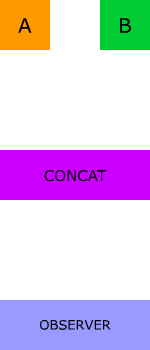| import { ApolloLink } from 'apollo-link' | |
| import QueueLink from 'apollo-link-queue' | |
| import { RetryLink } from 'apollo-link-retry' | |
| import { NetInfo } from 'react-native' | |
| import Observable from 'zen-observable' | |
| export function createOfflineLink({ cache }) { | |
| const retryLink = new RetryLink({ | |
| attempts: { | |
| max: Infinity, |
| const waitFor = (ms) => new Promise(r => setTimeout(r, ms)) | |
| const asyncForEach = async (array, callback) => { | |
| for (let index = 0; index < array.length; index++) { | |
| await callback(array[index], index, array) | |
| } | |
| } | |
| const start = async () => { | |
| await asyncForEach([1, 2, 3], async (num) => { | |
| await waitFor(50) |
Gitea is a painless self-hosted Git service. It is similar to GitHub, Bitbucket or Gitlab. The initial development have been done on Gogs but we have forked it and named it Gitea. If you want to read more about the reasons why we have done that please read this blog post.
Download Gitea binary from download page first.
$ wget https://dl.gitea.io/gitea/1.1.0/gitea-1.1.0-linux-amd64 -O giteaHere are the simple steps needed to create a deployment from your local GIT repository to a server based on this in-depth tutorial.
You are developing in a working-copy on your local machine, lets say on the master branch. Most of the time, people would push code to a remote server like github.com or gitlab.com and pull or export it to a production server. Or you use a service like deepl.io to act upon a Web-Hook that's triggered that service.
| { | |
| "name": "laravel/laravel", | |
| "description": "The Laravel Framework.", | |
| "keywords": ["framework", "laravel"], | |
| "license": "MIT", | |
| "require": { | |
| "laravel/framework": "4.1.*", | |
| "way/generators": "dev-master", | |
| "cartalyst/sentry": "2.0.*", | |
| "jasonlewis/basset": "dev-master", |
Browserify is a tool that allows us to write node-style modules that compile for use in the browser. Like node, we write our modules in separate files, exporting external methods and properties using the module.exports and exports variables
generator-browserify is a generator with a Browserify setup, offering choices between Gulp or Grunt and Foundation or Bootstrap.
generator-angular-with-browserify is a generator for bundling Angular.js with Browserify
This guide takes you through setting up the boilerplate for working on a re-usable Polymer element. It also covers the tooling to deploy a version of your package such that the master branch of your repository can be easily consumed by other apps or elements (e.g through Bower) and the gh-pages branch can be used for sharing the demo and documentation for your element.
Note: We assume you have git and Bower installed and use Scott Miles' Polymer boilerplate for getting started.
- Create a new directory on your system for working on Polymer elements (e.g
development). - Clone the untitled-element boilerplate inside this directory:
git clone git://github.com/polymerlabs/untitled-element.git. Rename the element and it's files accordingly. For example, if your element was calledtest-element, your file list would look a little like this:



